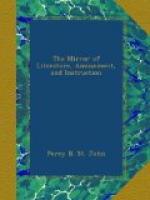and opened his house as the place of meeting of the
deputies, who assembled to protest against the illegality
of the proceedings of the Crown. Firmly, however,
attached to the principles of constitutional opposition,
and shrinking, therefore, from the probable effects
of a revolution, he was one of the last to abandon
the hope that his infatuated sovereign would open
his eyes to the gulf on the brink of which he was standing,
and by a timely revocation of the ordonnances, prevent
the necessity of the extreme measure of an appeal
to arms, and a consequent change of dynasty.
When these became inevitable, M. Perier attached himself
firmly to the work of consolidating the new throne
of Louis Philippe, and reassembling those elements
of order and stability which the convulsion of July
had scattered, but not annihilated. On the dissolution
of the ministry of M. Lafitte, M. Casimir Perier was
called to the head of the government, and immediately
entered into the system of conservative policy, which
he continued until the close of his career. The
last time he took any important part in the debates
of the Chamber of Deputies was on the 20th of March,
when he made an ingenious defence of the conduct of
government with respect to the events of Grenoble.
His last appearance in the Chamber was on the 29th
of March, when he merely brought in several private
bills. On the 3rd of April he was attacked by
the cholera, and, although the indefatigable care
bestowed on him by his medical attendants had more
than once apparently eradicated the disease, his frame,
enfeebled by a long standing internal complaint, as
well as by his intense and incessant application,
was unable to resist the violence of the disease,
and, after several relapses, he at length sunk under
his sufferings, on the morning of the 16th of May,
1832.
As an orator M. Perier was energetic and impassioned:
the natural warmth of his temper, added to the irritability
produced by illness, frequently imparted a brusque
acerbity to his style, which injured both the oratorical
and moral effect of his eloquence; but his reasoning
was forcible, and his manner commanding and effective.
“It is not our province,” says the editor
of the Journal, whence these particulars have been
chiefly obtained, “to examine the merits or
demerits of his political system: recorders of,
not actors in, the great political struggle in which
France is engaged, we have too often had occasion
to quote the enthusiastic eulogiums and unmeasured
invectives heaped upon him by different parties, to
render it necessary to repeat here, that he possessed
the strongest proofs against the reproach of mediocrity
ever being applicable to him.”
W.G.C.
* * * *
*
NEW BOOKS.
* * * *
*
CHARACTERISTICS OF WOMEN.




